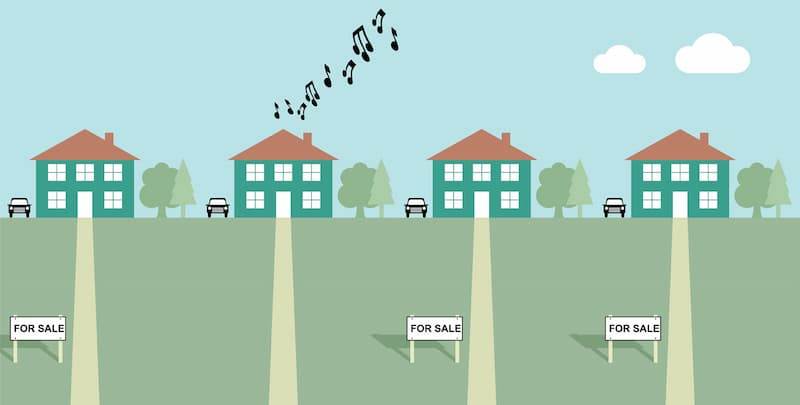The loud habits of a neighbor will easily become a challenge, whether you are coping with musically-inclined, confrontational, or party people. Especially if you’re trying to sleep or a long, exhausting step is over.
Noisy neighbors can ravage the quiet environment you call home. In this article, we will explore your choices on how to deal with noisy neighbors.

What Can You Do About Noisy Neighbors?
It’s late in the night, you’ve got to work the next morning, and all you can hear is your neighbor’s banging stereo next
door. Then, you begged them to dial it off, but they don’t seem to get it and the racket keeps moving. Now, the time has come to move this to the next level. What would you do for a loud neighbor?
1. Harmless Knock
A knock for courtesy can help you make your neighbors notice that you are not happy with their noise. Simply bang on the adjoining
wall a few times to give the neighbor a heads up. It is a less personal way of telling them to
pipe down, so ideally they can soon get the hint. Don’t pound on the wall. It can come off as offensive and trigger a fight between neighbors.
2. Pay Them a Visit
And you should give them a visit to their door if a polite knocking doesn’t succeed. Speak to your neighbor about the uproar you hear coming out of their house. You should politely remind them of the Ordinance on Quiet Hours and City Noise. As letters appear to come across as passive-aggressive, seek not to leave a message.
3. Police
Calling the cops is the first move you can do. Sometimes, it is enough to see a cop turn up at the door over a noise problem to get certain residents to dial it down. There are noise regulations in most cities, and frequent police visits may result in fines or even misdemeanor charges. Of which, if the offensive noises, such as
screaming, gunshots, or
fireworks, are terrifying, the sounds of objects thumping violently, you should certainly contact the police to check and guarantee that there is no risk to anyone.
Clearly, after asking the neighbor about the noise, contacting the cops is a move you would want to take with the non-threatening noise
complaint. Otherwise, you could make anyone who is practically in your own neighborhood a hated enemy.
Tip: If the neighbor is extremely obnoxious, the argument could escalate from merely thoughtlessly rude to violently confrontational by calling in the police. If you file a noise report, be on the alert for harm to your house or possessions, and be willing to contact the police again should any retribution occur. Using recordings of the disturbance as evidence can be wise.
Noise complaints and what you need to know before calling police
Nuisance Suit
If the authorities are hesitant to do anything about the disturbance, you can take it into your own hands if you live in a place where there are no noise regulations (read more about noise regulations on
epa.nsw.gov.au) (like remote or suburban areas), or if you believe the police are not doing anything. A
case against a loud neighbor may be brought on a nuisance theory.
You will have to show to the court to make your nuisance case, that:
● There is unnecessary and alarming noise coming from the land of your neighbor,
● That the neighbor creates the noise or is the owner (and therefore liable for the noise his/her tenants make),
● That your home enjoyment is compromised, and that it affects you, and,
● You requested the individual to stop the noise, but they declined to do so and/or declined to.
4. Soundproofing
Although you can’t do anything about soundproofing the home’s construction, by dampening the sound a bit, you can keep noise from coming into your
apartment (read about how to make a room soundproof from
outside noise on
silencewiki.com). Start by replacing each of your windows with heavy, soundproof curtains.
White noise devices will help block out the disruptions whether the noise comes from your side or upstairs neighbors (read about white noise on silencewiki.com). Just don’t become the irritating and noisy neighbor playing his/her computer. In the meantime, mainly for sleep, you could buy earplugs or any noise-canceling device.
Video Tip: Dealing With Annoying Neighbors
Law and Noise
There are regulations and ordinances in nearly every city that forbid extreme, unwanted, and unacceptable levels of noise.
When you discover municipal noise rules that apply to the city in which you live, don’t be shocked to find out that certain hours of the day are set aside by the legislation when there is meant to be a general silence. These hours vary and are depending on the day.
What Can You Do?
There are two separate recourses that can be obtained from such a lawsuit, generally speaking. You will possibly get away with filing a case in small claims court if you seek money damages. Nevertheless, if you demand a restraining order from the judge aimed at your neighbor to stop and avoid creating the noise, then you will have to file a case in standard civil court.
You would need to argue that there is unreasonable and distracting noise in order to win a lawsuit in small claims court (as also stated above) and that your neighbor is the source of the noise. First, you would need to prove that you are disrupting your peaceful enjoyment of your home and that you have already requested the person to avoid making the noise. In order to make your point, you will need evidence (eg. recordings and witnesses).
Did you know: Small claims damages are restricted in most jurisdictions to maximums ranging from $2,500 to $7,500. A decent starting point is $20 to $30 a day, which is interrupted by the noise. You will be entitled to demand a larger sum if the work performance has been impaired.
How Late Can Neighbors Be Loud?
Most municipal or local noise ordinances enforce “quiet hours” for example, from 10 p.m. towards 7 a.m. on the weekdays and up to 8 or 9 a.m on Weekends. So it would be permissible to use a gas mower or any other noise devices at 10 a.m. on Saturday, but not at seven in the morning.
Some noises that are uniformly unsettling are generally forbidden or restricted. For example, unless there is a risk, most cities forbid honking car horns. This suggests that the frequent early morning crowing for the carpool across the street is an infringement. Two more widely controlled noises include dog barking and
motorcycle noise.
Can I Call the Police for Loud Neighbors?
You should contact the cops if nothing of your ways has worked out. You should convince the police that you have managed to fix the noise issue on your own, but that the noise laws appear to be broken by your neighbor. The police can come in to investigate at this stage. At a time where you suspect the noise code is being violated, the safest bet is to call the police immediately or provide the time span over which the noise violation occurs itself.
Noise Complaint

Talking to them about their noise levels and how to better fix the problem is the first step to coping with loud neighbors. Confrontation can be challenging and unpleasant, nevertheless. When handled wrong, a simple complaint may be taken to nuclear measures. When approaching your neighbor about a noise complaint (more about noise complaint on
noisefree.org), here are few tips to follow.
Mind your objective: Don’t wander off the track. You have come to address a problem with noise. Your situation would not be helped by being sidetracked by frustration or basic distractions. To address the subject, pick a neutral territory, whether you call your neighbor out for coffee or meet them on the sidewalk.
If circumstances get intense, walk away: Worst case scenario, your disagreement turns to an all-out heated exchange. Like the ones, you want to skip a family vacation dinner. Walk down if you see the scenario veering out of hand. Apologize, and let that be. You’re never going to force an angry citizen to listen to your argument about the noise. It’s a waste of time.
One of the last moves that you can take when dealing with loud neighbors is to file a noise complaint. When other, more peaceful, strategies have failed to modify the actions of your neighbor, use this as a last resort.
You’ll have to decide who you would like to file the case with before initiating a noise complaint. You may need to lodge a complaint with your landlord if you live in the same building. You may have to report with the police if your neighbor lives next door in an apartment or townhouse that your landlord doesn’t own.
Check to see if your tenancy arrangement includes a noise clause before making a noise lawsuit with your landlord. Expect the same outcome after filing a complaint with the police. The police can give your neighbor a ticket after a notice to avoid disturbing the peace with their noise.
Video Report: When I Called Noise Control On Our Neighbour!





